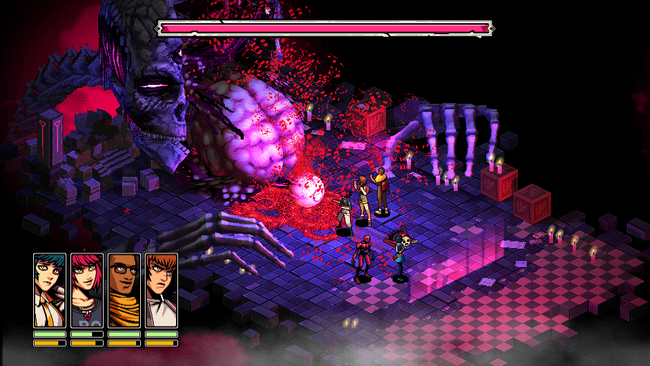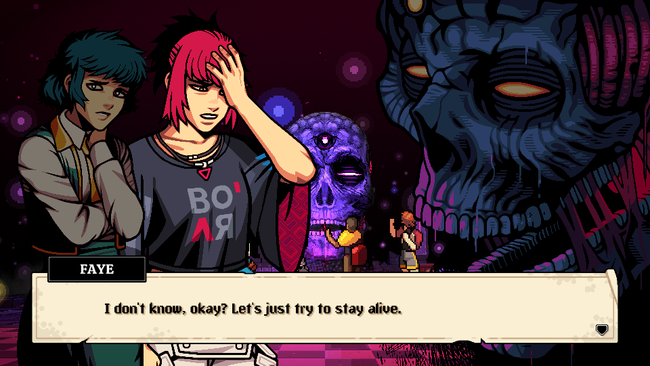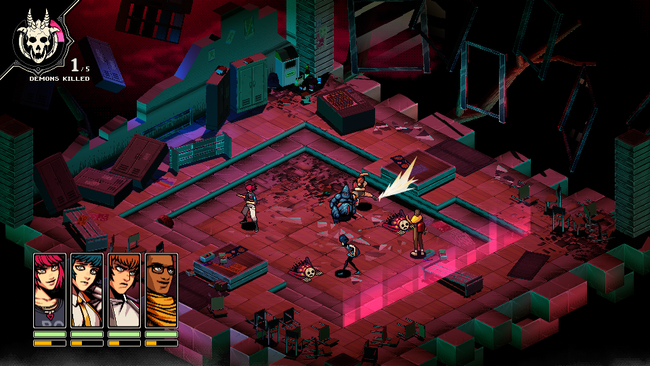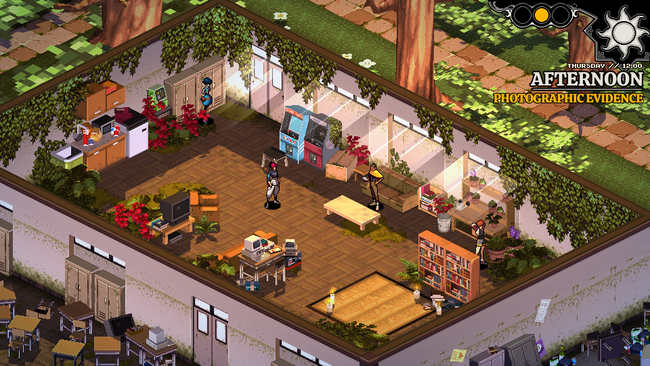
Demonschool Review
Every so often, a game feels as if someone rifled through your brain for favorite high school movies and shows, scrambling them into something eerily familiar yet fresh. Demonschool belongs in that category. It reminds me of so many media experiences I’ve loved over the last twenty-five years without ever feeling like a cheap parody. Demonschool is a diabolically good time.
The game begins with players assuming control of demon-hunting college students who arrive on a mysterious island campus. Their college experience quickly involves attempting to save the world, all while balancing their academic responsibilities. This setup feels inspired by the genre shows I mainlined in the early aughts: hints of Buffy the Vampire Slayer, a dash of Daria, and the PSX-era Persona aesthetic are well-represented. Professors seem evil from the jump. A body count of twenty-somethings reliably climbs. Hip, quippy misfits hide trauma beneath sarcasm. The game has the hallmarks of a long-defunct WB show, and I’m here for it.

The game is a tactical RPG constantly peeling back layers and adding additional elements, and that audacity is precisely what keeps Demonschool from buckling under the weight of homage. It draws on recognizable elements from its inspiration with monster-of-the-week plots and acutely self-aware banter. But it carefully integrates them to maintain a feeling of freshness. The island campus, isolated from the outside world, immediately creates a distinctive setting, and the writing leans into this potential. Mysteries thrive in unexpected places: courtyards, abandoned departments, and shadowy corners of facilities where no real university would schedule classes.
The cast of heroes and villains alike shines, with a diverse cast of collegiate heroes who are mostly swept up into the supernatural chaos on campus. The game initially centers on Frey as she arrives on campus. She is clearly knowledgeable about demons and the supernatural. Her cautious classmate, Namako, is quickly involved in the overworldly. Along the journey, they encounter numerous new allies, each bringing their own strengths and abilities into battle.
These personalities feel distinctive rather than archetypal. Conversation snaps with character, and the script stays wry without turning saccharine. Classic horror inspo is clear: early quests include tracking down a lethal VHS tape. Still, the nods never collapse into cheap “remember this?” nostalgia. They’re woven in with humor and twisty enough that players can appreciate the reference and what the game is doing with it.

It’s impossible to talk about Demonschool without noting how it distinctly echoes Persona’s style. The angular, isometric art and dreamlike visuals immediately evoke Persona’s influence. But Demonschool adds its own gritty twist. Bright, sometimes jarring colors enhance the uncanny mood. This aesthetic choice makes sense for a university located at the edge of Hell.
Environments pop in bold hues: acid greens for occult themes, lurid reds in demon scenes, bleached purples on haunted nights. Surrealism turns the campus into a liminal dreamscape. Menus echo horror, with jagged UI and glitch overlays keeping the supernatural close.
That visual identity pairs beautifully with the game’s sense of humor. Characters chatter with a sardonic wit that cuts even as events grow increasingly unhinged. Upon defeat, units literally explode in a hilarious bloodbath. I immediately internalized this as a nod to a similar effect from the PSX-era SRPG Vandal Hearts. It would be easy for the tone to veer into flippant, but Demonschool maintains balance as it flops between humor and horror.

Demonschool’s combat is another interesting take on the tactical RPG standard. Battles take place on grid-based maps. Each party member’s special abilities provide distinct advantages, with classic damage dealers mixed in with utility-based teammates who specialize in stuns, buffs, and elemental exploitation. The elemental system has a macabre bent: aside from your standard fire-water-lightning triangle, there are also combination types like rust and blood. These open the door for some delightfully bizarre interactions.
The system can feel complicated at first. But the logic eventually clicks. Battles become dynamic, turn-based puzzles rather than standard SRPG skirmishes. There are no experience points or levels; instead, party and asset management bring customization and complexity. It’s exciting to wonder how your party will survive a typical battle—let alone the game’s tricky, deviously designed boss encounters, which are spectacles in their own right.
That’s not to say combat is simple or forgiving. Quite the opposite: the game’s low HP pools mean brute force is almost never viable. Power-leveling your characters is not a thing here. You’re required to think several turns ahead, line up party members, and manage positioning with care. A miscalculation can wipe out your team in seconds. This leads to (at least my) frequent use of the rewind feature, which allows a second chance without having to restart the entire skirmish.

This puzzle-driven structure reminded me of Paper Mario: The Origami King, where each battle feels like it contains an intended trick or solution. The fun comes from recognizing the developers' intention and finding ways to overcome or even subvert it. When your tactical plan comes together perfectly, it’s deeply satisfying.
One of Demonschool’s hidden strengths is its willingness to break the formula with quick, clever minigames and relationship-building components sprinkled throughout the narrative. These build personality, deepen the world's strangeness, and occasionally expand on lore. You might help a student run a campus club, track down strange noises in a dorm, or navigate a demon’s mind in a surreal fever-dream. It’s these bits that give individual characters moments to shine, and the game takes great care in developing this group.
The showstopper is the music. Synths pulse through city scenes, casting a supernatural haze. Battle tracks amp up tension. The soundtrack stands alone but brings the game alive. Sound design matches: demonic pulses, void snaps, cursed static, and clacking bones set the mood.
After a long development, it’s great to experience something so cohesive. Music, art, UI, dialogue, and animation click together. The result: a stylish game as inventive as its horror inspirations.
Demonschool works because it trusts you. It doesn’t over-explain or lean too hard on creaky nostalgia. You solve the weirdness and enjoy the ride. Strategic, puzzle-like combat replaces grinding, and seeing multiple endings is devilish fun. The only scary thing is how fun it is.